Coronavirus: London cuts Tube trains and warns 'don't travel unless you really have to' (original) (raw)
New measures are being introduced across London's transport network in response to the worsening coronavirus outbreak.
A partial shutdown of the London Underground is beginning today - and up to 40 stations that do not interchange with other lines are going to be closed "until further notice".
As the morning rush hour began, several other stations were closed owing to "operational restrictions".
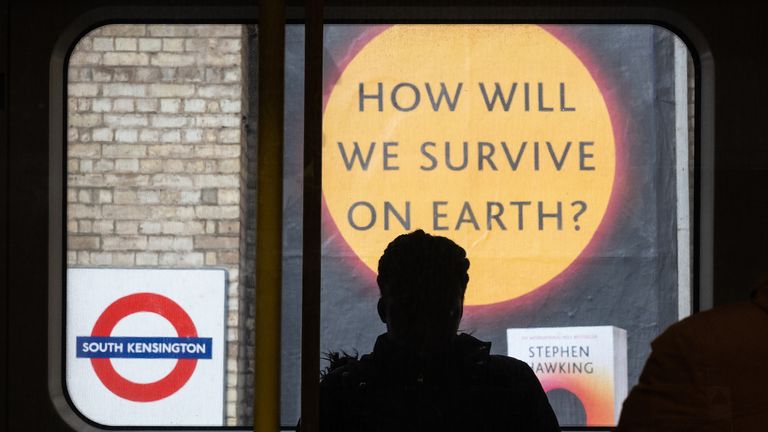
Image: Services across London's transport network are being severely reduced
The Waterloo and City line is going to shut completely from Friday, and Night Tube services that normally run on Friday and Saturday nights are being suspended.
Transport for London (TfL) is also planning to reduce the frequency of services across its network from Monday "to provide a service for critical workers to get where they need to".
The Tube, London Overground, TfL Rail, the DLR and London trams will all be affected by this reduction in service.
Late services will continue to run for "essential journeys" on both the Tube and Overground - with bus services continuing through the night.
More on Covid-19
-
 Older people in England happier and more satisfied now than before COVID, researchers say
Older people in England happier and more satisfied now than before COVID, researchers say -
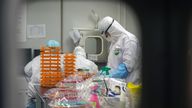 CIA believes lab leak most likely caused COVID outbreak
CIA believes lab leak most likely caused COVID outbreak -
 COVID inquiry latest: Watch live as Matt Hancock gives evidence
COVID inquiry latest: Watch live as Matt Hancock gives evidence
London Mayor Sadiq Khan said: "People should not be travelling, by any means, unless they really, really have to. Londoners should be avoiding social interaction unless absolutely necessary, and that means they should be avoiding using the transport network unless absolutely necessary.
"London will get through these extraordinarily challenging times, and ensuring the capital's critical workers can move around the city will be crucial.
"I'm urging Londoners to only use public transport for essential journeys. Everyone should follow this and the other advice to help keep themselves and each other safe."
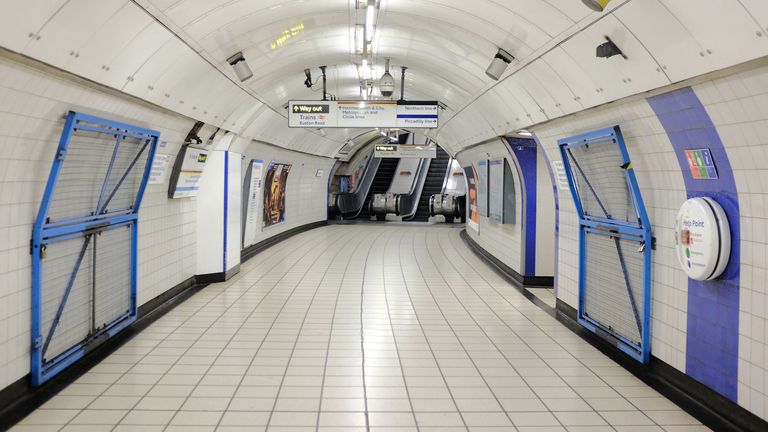
Image: An eerily quiet Kings Cross tube station in London
The following stations could close from today:
Bakerloo line
- Lambeth North
- Regents Park
- Warwick Avenue
- Kilburn Park
- Charing Cross
Central line
- Holland Park
- Queensway
- Lancaster Gate
- Chancery Lane
- Redbridge
Circle line
- Bayswater
- Great Portland Street
- Barbican
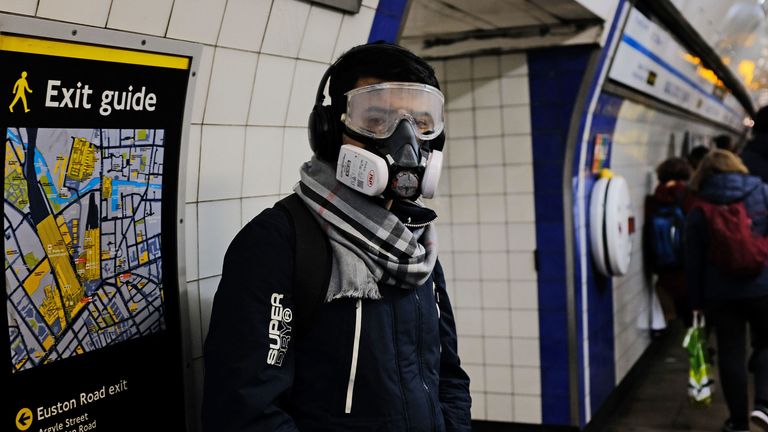
Image: A person wearing a full face mask in King's Cross underground station
District line
- Bow Road
- Stepney Green
- Mansion House
- Temple
- St James's Park
- Gloucester Road
Jubilee line
- Swiss Cottage
- St John's Wood
- Bermondsey
- Southwark
Northern line
- Tufnell Park
- Chalk Farm
- Mornington Crescent
- Goodge Street
- Borough
- Clapham South
- Tooting Bec
- South Wimbledon
- Hampstead
Piccadilly line
- Caledonian Road
- Arsenal
- Covent Garden
- Hyde Park Corner
- Bounds Green
- Manor House
Victoria line
- Pimlico
- Blackhorse Road
It follows advice from the government earlier this week for everyone to stop all non-essential travel.
The government is also considering closing most shops in the capital by the weekend, according to Whitehall sources.
Pharmacies and supermarkets are expected to stay open under the tougher measures.
On Monday, the prime minister ordered Britons to avoid pubs, clubs, restaurants and theatres, but no measures had been announced to close establishments.
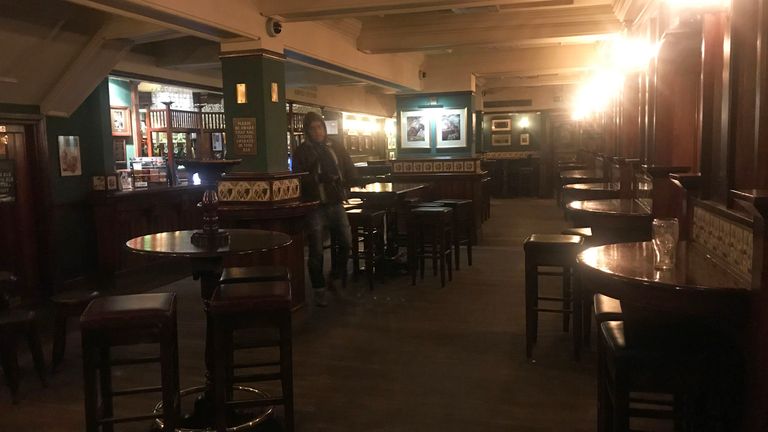
Image: A solitary drinker in The Chandos pub at Charing Cross
Boris Johnson has said London is ahead of other parts of the UK in terms of how much it has been affected by COVID-19.
Londoners have already been told to take social distancing measures "particularly seriously", including working from home where possible, avoiding confined spaces, and not having any unnecessary social contact.
As of 9am on Wednesday, there were 2,626 confirmed cases of coronavirus in the UK - a rise of 676 in the last 24 hours.
Please use Chrome browser for a more accessible video player
Analysis: Just how serious could COVID-19 cases be?
Of these, 953 are in London, and the capital accounts for at least 35 of the 104 UK deaths.
The worst-affected London boroughs are Southwark with 70 cases, Westminster with 68 cases, and Lambeth with 61 confirmed cases.
The government's chief scientific adviser, Sir Patrick Vallance, has suggested there could be as many as 55,000 coronavirus cases already in the UK and 20,000 deaths or below would be a "good outcome".
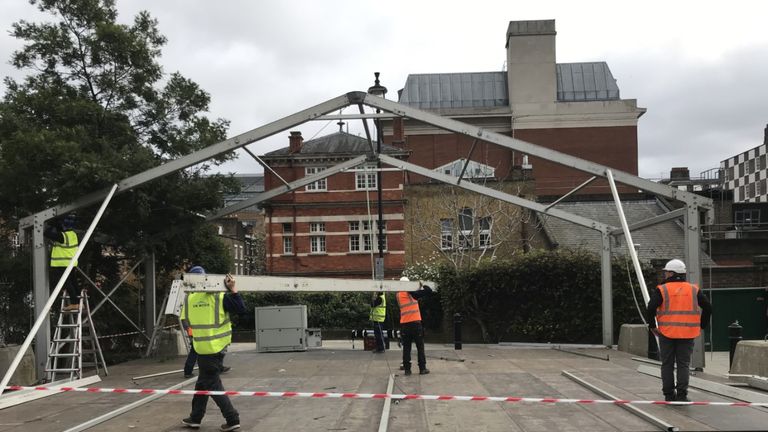
Image: A London mortuary is being expanded to cope with the bodies of coronavirus victims
The latest developments in the UK:
- Up to 20,000 service personnel are being put on standby to help drive oxygen tankers, support police and boost hospital capacity
- The government has promised emergency legislation to suspend new evictions from social or rented accommodation for at least three months
- All schools will close from Friday until further notice and exams and assessments will not be held this academic year
- Thirty-two more people died in England after testing positive for coronavirus, it was reported on Wednesday, taking the total number of UK deaths to 104
- Critically ill COVID-19 patients will be given an experimental new treatment as soon as Monday, as part of the first trial of its kind
Podcast This content is provided by Podcast, which may be using cookies and other technologies. To show you this content, we need your permission to use cookies. You can use the buttons below to amend your preferences to enable Podcast cookies or to allow those cookies just once. You can change your settings at any time via the Privacy Options. Unfortunately we have been unable to verify if you have consented to Podcast cookies. To view this content you can use the button below to allow Podcast cookies for this session only.
:: Listen to the Daily podcast on Apple Podcasts, Google Podcasts, Spotify, Spreaker
Mr Johnson is now holding daily televised news conferences in Downing Street to keep the public informed of the government's response.
Number 10 has said it would be rapidly increasing the number of coronavirus tests, with as many as 25,000 people tested within NHS hospitals each day.
The prime minister also called on companies to work with the government to rapidly develop a test to establish whether people have developed immunity, in order to help get NHS staff back to work as quickly as possible.
The World Health Organisation recently criticised national governments for not conducting enough tests on their populations.